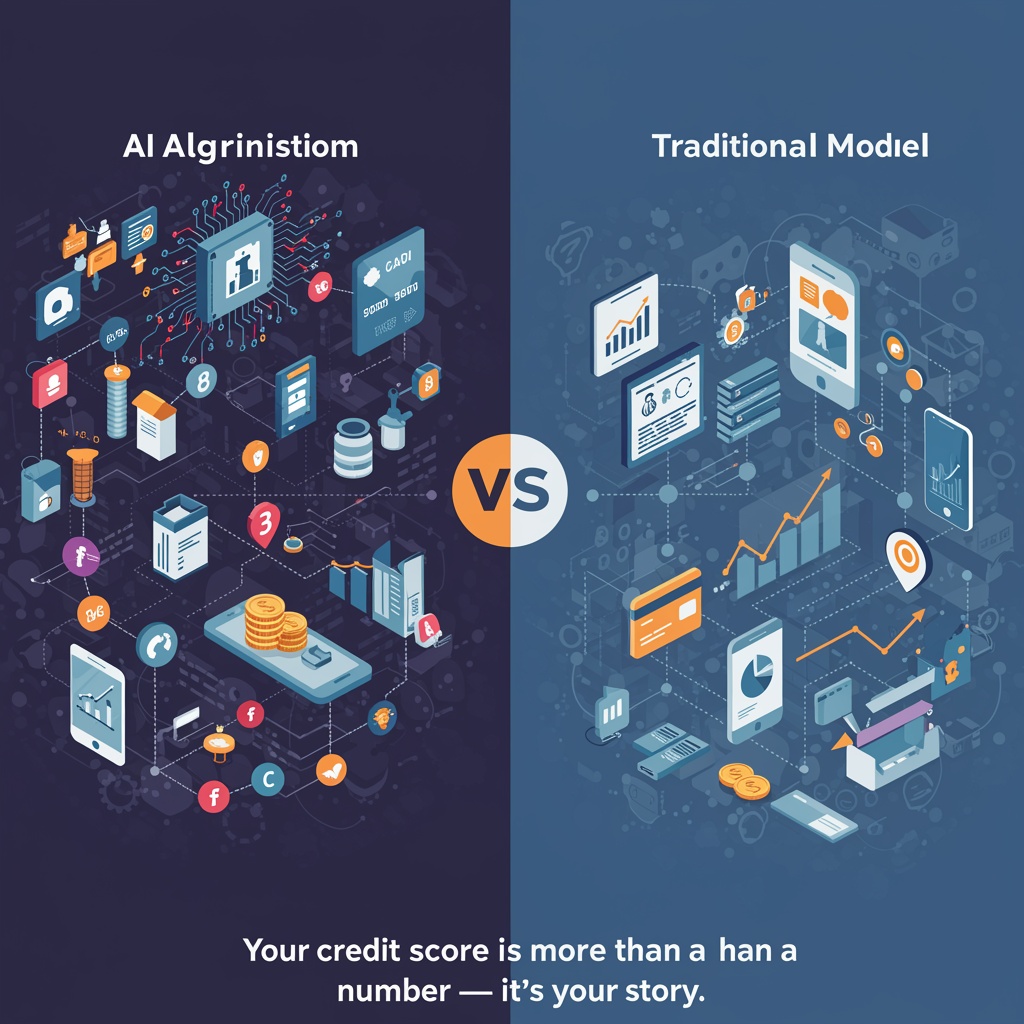“Suppose you have been disappointed by the traditional credit score model for not assessing young adults, contract workers, immigrants, or small businesses for loans or cards due to a ‘thin’ credit file. In that case, they are a victim of undemocratizing finance.
Reshaping traditional model with AI-powered model: the innovative AI-powered credit score model that uses machine learning to analyze thousands of data points—from utility payments to social trends—and unlock fairer financial access.
This article reveals the top 5 fintech innovators rewriting creditworthiness rules, helping you discover platforms that see your whole economic story. We’ll discuss how these fintechs use AI to assess the creditworthiness of individuals and businesses. From analyzing bill payments to social media behavior as a reference to increase your credit score, it is also utilized as a tool to provide many financial grants. We will see how AI-powered credit score models impact our economic future.”
1. Introduction:
In today’s world, human progress is linked with advancements in financial systems, including credit scoring sectors. A good credit score can secure people’s future by availing better economic opportunities and making life comfortable and affordable. A good credit score can get instant approval for a home or car loan and credit card application. Insurance companies use credit scores to assess risk and determine premiums for auto, health, and home insurance; a good credit score can lower monthly premiums and provide better coverage options. A good credit score can provide financial stability, good money management, and stress-free life.

2. Overview of AI in the credit scoring sector:
The Fintech industry is revolutionized by technical advancements that ensure greater precision, wider accessibility, and improved efficiency. Innovation of AI in the credit scoring sector improves credit assessments, fraud prevention, and financial inclusion. The traditional credit scoring model determines a standard approach, relying mainly on credit history and historical economic data. The conventional scoring model has several limitations in evaluating accuracy, inclusivity, and transparency. Also, the credit approval numbers were lower due to stringent regulatory compliances.
3. Importance of AI-driven credit assessments:
In this emerging world, technology continues to empower the credit scoring sector by innovating different credit score models based on AI & Machine learning systems. Artificial Intelligence can scan individuals’ financial data rapidly to provide and guide them in availing loans or reasonable premiums for their insurance in any required sector.
AI-powered models immediately lend money to needy businesses by surpassing the traditional methods, which include time-oriented and lengthy paperwork processes and unnecessary verifications. Also, with AI-driven credit assessment, individuals gain a deeper understanding of risk and choose the lowest interest rate provided to them based on their credit score; it also reduces unnecessary penalties and hidden charges. It makes any individual aware of the benefits of a good credit score without having proper financial knowledge.
AI-packed models also improve financial systems by detecting fraud risks and applying compulsory regulatory compliance.
Nowadays, people can quickly check their credit score ratings on mobile while enjoying their homes and apply for several loans instantly based on their credit score. AI-powered systems also motivate individuals to maintain good credit scores for their benefit.

4. Top 5 Fintech Companies using AI for credit Scoring
1. Upstart: it was founded in 2012 and headquartered in San Mateo, California, USA. Unlike other traditional credit score companies, which only analyze a few factors, upstart uses machine learning models and analyses more than 1,600+ variables (i.e., education, employment, rent history) to predict applicant risk better.
Upstart key features are that they are less dependent on FICO scores, and the company has broadened its lending practices by attracting qualified borrowers and young adults by applying lower interest rates. Upstart focuses on personal loans, auto loans, and mortgages. They also facilitate less biased lending using behavioral science rather than your demographics.
2. Zest AI: Zest AI was founded in 2009 and is headquartered in Burbank, California, USA. Zest AI uses explainable AI [XAI] with integrated models for transparency in underwriting. As a key feature, Zest provides ZAML [Zest Automated Machine Learning] platforms for lenders, which sometimes reduces default risk by up to 50 %. Zest management emphasizes fairness and transparency more and opposes racial/gender bias in credit decisions.
They also focus more on regulatory compliance and, as an added feature, provide resources to smaller banks to compete with larger institutions using sophisticated AI.
3. Credolab: Credolab was founded in 2016 and is headquartered in Singapore. It uses safe and anonymous data from smartphones and online activities [such as App usage, typing speed, etc.]. Credolab uses AI technology that analyses over 80,000 details, including metadata points. This helps them create instant, accurate credit scores and valuable insights for lenders, all delivered through one easy-to-use system. It also issues on-the-spot assessments of creditworthiness.
4. LenddoEFL: It was founded in 2011, currently operating in 20+ countries. Its headquarters is in Singapore. LenddoEFL uses AI technology, integrating psychometric testing, social media behavior, and device data to assess creditworthiness. Its key features include Non-traditional scoring for unbanked individuals. Also, it is very popular among banks like HSBC and First Bank. Till now, LenddoEFL has approved $2B+ in loans across emerging markets [e.g., India, Colombia]. Also, they empower small businesses through accessible credit.
5. Experian Boost: It was launched in 2019, and its parent company’s name was Experian. Its headquarters is in California, USA. Experian Boost uses AI technology to aggregate utility/telecom payment data via open banking APIs. Its key feature is to analyze users ‘ added positive payment history, such as Electricity bills, Netflix bills, etc. Also, it considers instant FICO scores.
Experian Boost attracts its customers by providing free service with Experian credit monitoring. Experian has helped 10M+ users by improving credit scores, with average increases of 10–20 points, and democratized credit-building for renters, gig workers, and newcomers.
5. How AI is transforming the Credit Scoring Sector:
AI-enabled models provide faster, transparent, and inclusive results to abroader range of people. AI-powered models can screen and process a vast range of data. Also, the decision-making is frequent, resulting in fewer chances of fraud or loan repayment, increasing profitability. The AI-packed model gives chances to those who don’t have proper financial data or credit history to avail of financial services such as loans, insurance, etc. Modern technology acknowledges credit history, bank transactions, spending patterns, mobile phone, and utility payment details to eliminate unfair biases in credit assessments.
5.1 Enhanced Risk Prediction:
Predictive Analysis uses statistical Algorithms and Machine Learning analytics to predict the future based on vast historical data, vital financial behaviors, and patterns to identify whether any individual or business can repay a loan or potential fraud. This mitigates the risk assessment while crediting or lending any loan.
In addition, AI-packed models also assess real-time financial activity and keep updating individuals’ or businesses’ credit scores, based on which one can make more accurate and timely decisions. Also, AI-based models monitor spending behaviors, digital transactions, and many others to identify the creditworthiness of individuals or businesses.

5.2 Financial Inclusion for underbanked populations:
The significant limitations of traditional credit score models where financial inclusion of underbanked [workers, contractors, freelancers, immigrants, or people with no credit history] people were briefly addressed by Modern technique AI models. In this AI-powered model, a broader range of data, such as digital transactions, mobile phones, and utility or rent payments, is also scanned.
AI algorithms assess individuals’ spending patterns and behaviors and approve them with a credit score, which can later be used to avail of credit support or lend money from banks or financial institutions. After implementing AI-powered models and Bias mitigation techniques, banks and financial institutions have seen enormous growth in customer addition and satisfaction.
5.3 Fraud Detection and Firm Compliances:
Implementing an AI-enabled credit score model integrates an algorithm to identify various patterns and behaviors in individuals’ spending, digital payments, utility bills, social media activity, and historical data. They raise a red flag if suspicious activity, such as loan fraud or credit misuse, is spotted. Such a protection enables the financial institution to lend to such individuals or businesses.
Financial institutions are bound to adhere to strict regulatory compliance while providing various kinds of financial credit or support to individuals or companies. AI-powered models are equipped with all security tools to identify any illegal activity or misuse of regulation and protect user data through blockchain, encryption, and other secure AI models.
6. Conclusion:
In conclusion, integrating AI into the credit scoring sector is a game changer, unlocking new avenues for individuals and businesses. As we’ve explored, companies like Upstart, Zest AI, Credolab, LenddoEFL, and Experian Boost are redefining accessibility to credit, enabling fairer assessments, and fostering financial inclusion for those previously overlooked. Considering all these factors, AI advancements in credit scoring will eventually benefit individuals and businesses.
These AI-driven models go beyond just numbers; they empower people with vital financial insights, allowing them to make informed decisions that lead to better economic opportunities. Imagine checking your credit score from the comfort of your home and getting instant loan approvals, all thanks to technology that understands your unique financial journey. This is all getting very exciting as people can now quickly and instantly get financial help because of the potential of AI innovations in the credit industry.
As we delve into the future of credit scoring, the emphasis on transparency, risk prediction, and fraud detection stands out. Is AI the key to a more equitable financial landscape? With ongoing developments in this field, the answer seems yes. Let’s embrace these technological advancements and rethink our approach to managing credit. After all, a better understanding of credit scores enhances our financial stability and enriches our lives. So, now we can confidently be ready to take charge of our economic future.
FAQ’s:
- How does AI improve credit scoring compared to traditional methods?
AI analyzes thousands of data points, such as rent payments, education, utility payments, and smartphone usage, to compute individuals’ creditworthiness more accurately than traditional models based solely on credit history. Organizations such as Upstart and Credolab apply machine learning to eliminate bias and approve loans to those missed by conventional systems.
- How can AI credit scoring help those with no credit history?
Companies like LenddoEFL and Experian Boost have built efficient AI platforms that review alternative data (utility bills and social media activity) to score people without traditional credit histories. This allows freelancers, immigrants, contract workers, and young adults to access loans and build financial stability.
- How secure is AI credit scoring against fraud?
Some AI models utilize real-time fraud detection (Zest AI monitors spending behavior patterns and flags unusual transactions). Blockchain encryption alongside explainable AI (XAI) provides an extra layer of security, ensuring compliance in a data-dependent world while safeguarding the user’s data.
- Why trust an AI credit score more than our traditional FICO?
AI scores are more inclusive and less biased.’ For example, Experian Boost gives you credit for paying streaming bills; Zest AI removes racial/gender bias. AI learns how you manage your money and adapts it in real-time, giving you a more accurate, fairer, on-the-fly look at your credit health.
May you like: 10 REGRETS TO AVOID: “INSURANCE POLICIES YOU CAN’T AFFORD TO SKIP”
5 CAR INSURANCE MYTHS DEBUNKED: UNVEILING THE TRUTH TO EMPOWER YOU
